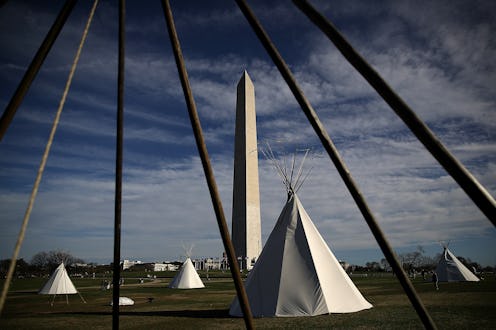News
A Small Victory For Standing Rock

A federal judge handed the Dakota Access Pipeline another legal hurdle on Wednesday. After scrutinizing the project's environmental review, U.S. District Court Judge James Boasberg ruled that it didn't go far enough. The U.S. Army Corps of Engineers, the federal agency which permitted the project, would need to conduct a new analysis to address the consequences of a DAPL oil spill, Boasberg stated.
The ruling means a few important things in the big scheme of the pipeline. Most importantly, this is not endgame for the pipeline, as the judge's 91-page decision did not suspend the project's already ongoing operations. Boasberg wrote that whether DAPL would be halted is an entirely separate question for the future.
Furthermore, Boasberg ensured the Army Corps "substantially complied” with the National Environmental Policy Act, a law that requires all executive federal agencies to review the environmental impact of major projects. The law was introduced following the 1969 oil spill in Santa Barbara. However, the Army Corps reportedly did not "consider the impacts of an oil spill on fishing rights, hunting rights, or environmental justice," Boasberg said.
Dakota Access started commercial operations on the 1,172-mile-long pipeline on June 1, but not without controversy. Led by the Standing Rock Sioux, "No DAPL" protests began in mid 2016 because of the pipeline's potential to contaminate the region's water supply. The pipeline, which passes by the Standing Rock Indian Reservation and through disputed Sioux land, also disrupts sacred, Native American burial grounds.
Energy Transfer Partners, the company developing the pipeline, has defended its project and called some protestors "extremists opposed to any and all use of fossil fuels." The pipeline would be constructed deep underground with safe technology, not endangering any water supplies, according to their DAPL website.
Protestors demanding that the project cease operation have been met with water cannons and other police brutalities. Although the vocal opposition to DAPL attracted national attention and stalled the project, Trump issued an executive order days after being sworn-in that gave the Army Corps the green light to finish construction.
The $3.8 billion project is expected to transport half a million barrels of crude oil from North Dakota to Illinois, and has already sprung three minor leaks before becoming fully operational. The first two in March required contaminated snow and soil to be removed and the most recent spill in April has also been cleaned up. All three incidents were caused by mechanical failures.
Environmentalists and concerned residents in the affected areas are critical of the project because of its numerous crossings under large bodies of water, including Lake Oahe and the Missouri River — the Standing Rock's primary source of drinking water. The Standing Rock Sioux and Army Corps are expected to meet Boasberg next week to discuss the next moves.